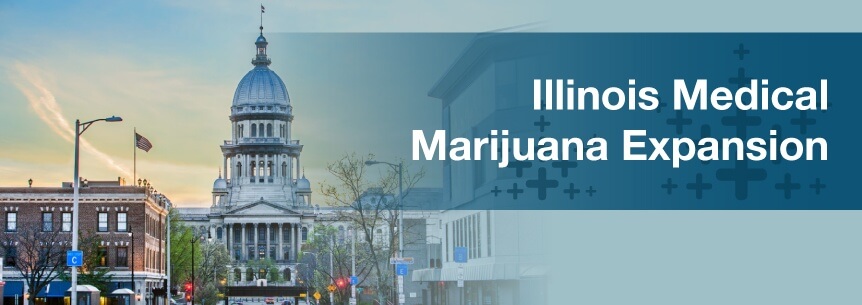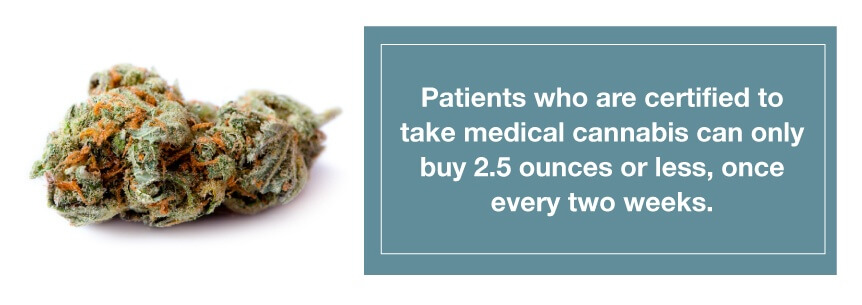
On Tuesday, August 28, 2018, Bruce Rauner, the governor of Illinois signed a bill for Illinois medical marijuana expansion. The new bill, known as the Opioid Alternative Pilot Program, indirectly adds to the Illinois qualifying conditions by allowing patients to receive treatment for pain with medical marijuana instead of opioid painkillers.
This new law is a timely response to a large number of deaths caused using narcotics. In 2016 alone, nearly 2000 people were killed in the state and about 72,000 nationwide after overdosing on opioid painkillers.
The Center for Disease Control estimates that about 500,000 people in the U.S. died because of an overdose of narcotics from 2000 to 2014. From 2008 to 2018, more than 11,000 fatalities occurred in Illinois due to excessive use of narcotics. Meanwhile, the U.S. Drug Enforcement Administration recorded no deaths due to marijuana overdose.
This program reduces the delays involved in obtaining medical marijuana. It allows people who were receiving treatment for chronic pain through opioids to start enjoying medical cannabis. Here are some vital facts about the new program.
The background and fingerprint checks have been a major bottleneck in the state’s medical marijuana program. But the new law eliminates the need for background and criminal checks.
Officials of the state’s Department of Public Health supported the termination of the background check — it hindered many patients due to a large backlog of patient approvals. With this new law, residents can easily go to a licensed dispensary and pick up their recommended dose of marijuana after seeing their doctor.
The new law permits patients to use medical marijuana in place of opioid pain medication. This indicates that those who receive prescriptions for painkillers like Vicodin or OxyContin can easily be certified for medical marijuana.
Patients can take the certification provided by their doctor to a marijuana dispensary, where they’ll complete their registration and be able to start buying medical cannabis immediately. State health officials must review the registration shortly after to ensure it complies with legal requirements. This review process will, however, be difficult unless the computer systems in the dispensary are upgraded.
All medical marijuana patients who have any of the qualifying conditions can now get provisional approval. Rather than go through a lengthy process that requires fingerprinting and background checks, they can get approval to buy medical cannabis quickly. Then, their application for their full certification will be processed later.
There are two categories of certification in the new law:

Patients who are certified to take medical cannabis can only buy 2.5 ounces or less, once every two weeks. The medical marijuana law and the new opioid replacement bill will only be valid until July 1st, 2020 when the initial pilot phase will end.
Patients can receive medical cannabis to treat more than 40 qualifying debilitating conditions, including:
In Illinois, medical cannabis is also approved for treating these conditions:
In January 2018, an Illinois judge ruled that the state should add intractable pain to the qualifying conditions for medical marijuana. Raymond Mitchell, the Cook County Judge, ordered the Illinois Department of Health to include it, but they strongly opposed it.
Here are a few facts about the case:
While the signing of the opioid alternative program has been widely commended by many, the governor strongly opposes legalization of marijuana in the state.
Governor Bruce Rauner and other conservatives believe adding more qualifying conditions or legalizing marijuana for recreational use will increase the number of people driving under the influence of marijuana. They also think it will expose minors to the risk of marijuana abuse.
However, the Democratic candidate for November’s election supports the legalization of marijuana. Supporters of the bill to remove restrictions on the use of marijuana plan to push for the signing of the bill if J.B. Pritzker gets elected in November.
By December 1, 2018, the Department of Public Health will need to make alterations to the registration procedure. Some of the changes required to implement the new opioid alternative pilot program include that:
This new law makes it easier and faster for patients to enjoy the benefits of medical cannabis. It should bring relief to many, increase the sales at dispensaries and reduce deaths due to opioid use. Stay up to date with legislation changes and other marijuana industry news by following our blog.
No Information on MarijuanaDoctors.Com should be used to diagnose, treat, prevent or cure any disease or condition. You can view our Full Disclaimer here.